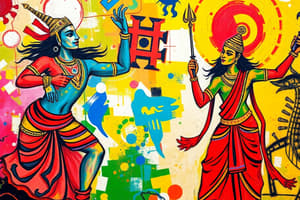Podcast
Questions and Answers
When did Modern Indian English Literature emerge?
When did Modern Indian English Literature emerge?
- Early 20th century
- Late 19th century
- Mid-20th century (correct)
- Post-2000
Which of the following is NOT a key feature of Modern Indian English Literature?
Which of the following is NOT a key feature of Modern Indian English Literature?
- Explores themes of identity and culture
- Written primarily in English
- Often blends traditional Indian narrative styles with Western literary techniques
- Predominantly written in Hindi (correct)
Which author is known for her novel 'Rich Like Us' (1985)?
Which author is known for her novel 'Rich Like Us' (1985)?
- Arundhati Roy
- Jhumpa Lahiri
- Amitav Ghosh
- Nayantara Sahgal (correct)
What is a distinctive feature of Indian English Literature?
What is a distinctive feature of Indian English Literature?
Which theme is commonly explored in Modern Indian English Literature?
Which theme is commonly explored in Modern Indian English Literature?
Which author won the Booker Prize for 'The God of Small Things' (1997)?
Which author won the Booker Prize for 'The God of Small Things' (1997)?
What is a trend in Modern Indian English Literature?
What is a trend in Modern Indian English Literature?
Who is considered one of the founders of Indian English literature?
Who is considered one of the founders of Indian English literature?
Flashcards are hidden until you start studying
Study Notes
Modern Indian English Literature
Historical Context
- Emerged in the mid-20th century, particularly after India gained independence in 1947
- Marked a shift from colonial to postcolonial literature
- Influenced by Indian independence movement, Partition, and social change
Key Features
- Written primarily in English, reflecting India's linguistic diversity
- Explores themes of identity, culture, history, and social issues
- Often blends traditional Indian narrative styles with Western literary techniques
- Frequently uses magical realism, a distinctive feature of Indian English literature
Notable Authors
- Raja Rao: Considered one of the founders of Indian English literature; wrote "Kanthapura" (1938)
- Mulk Raj Anand: Known for his novel "Untouchable" (1935), which highlights the struggles of India's lower castes
- Nayantara Sahgal: A prominent feminist writer; her novel "Rich Like Us" (1985) explores women's lives in independent India
- Salman Rushdie: A celebrated author; his novel "Midnight's Children" (1981) won the Booker Prize and is a seminal work of Indian English literature
- Amitav Ghosh: Acclaimed for his historical fiction, including "The Shadow Lines" (1988) and "The Glass Palace" (2000)
- Arundhati Roy: Won the Booker Prize for "The God of Small Things" (1997), a novel about family, love, and social hierarchy in Kerala
- Jhumpa Lahiri: Known for her short stories and novels exploring the Indian diaspora experience, including " Interpreter of Maladies" (1999)
Themes and Trends
- Exploration of Identity: Authors often grapple with the complexities of Indian identity, including cultural heritage, language, and belonging
- Social Commentary: Many works critique social issues, such as caste, gender, and class inequalities
- Hybridity and Cultural Fusion: Indian English literature often blends traditional and modern, local and global influences
- Diaspora and Migration: Authors increasingly explore the experiences of Indians living abroad, navigating cultural differences and belonging.
Modern Indian English Literature
Historical Context
- Emerged in the mid-20th century, after India gained independence in 1947
- Marked a shift from colonial to postcolonial literature
- Influenced by Indian independence movement, Partition, and social change
Key Features
- Written primarily in English, reflecting India's linguistic diversity
- Explores themes of identity, culture, history, and social issues
- Blends traditional Indian narrative styles with Western literary techniques
- Frequently uses magical realism
Notable Authors
- Raja Rao: Founded Indian English literature, wrote "Kanthapura" (1938)
- Mulk Raj Anand: Wrote "Untouchable" (1935), highlighting struggles of India's lower castes
- Nayantara Sahgal: Prominent feminist writer, wrote "Rich Like Us" (1985), exploring women's lives in independent India
- Salman Rushdie: Celebrated author, wrote "Midnight's Children" (1981), a seminal work of Indian English literature
- Amitav Ghosh: Acclaimed for historical fiction, including "The Shadow Lines" (1988) and "The Glass Palace" (2000)
- Arundhati Roy: Won the Booker Prize for "The God of Small Things" (1997), exploring family, love, and social hierarchy in Kerala
- Jhumpa Lahiri: Known for short stories and novels on the Indian diaspora experience, including "Interpreter of Maladies" (1999)
Themes and Trends
- Exploration of Identity: Complexities of Indian identity, cultural heritage, language, and belonging
- Social Commentary: Critique of social issues, including caste, gender, and class inequalities
- Hybridity and Cultural Fusion: Blending traditional and modern, local and global influences
- Diaspora and Migration: Exploring experiences of Indians living abroad, navigating cultural differences and belonging
Studying That Suits You
Use AI to generate personalized quizzes and flashcards to suit your learning preferences.




